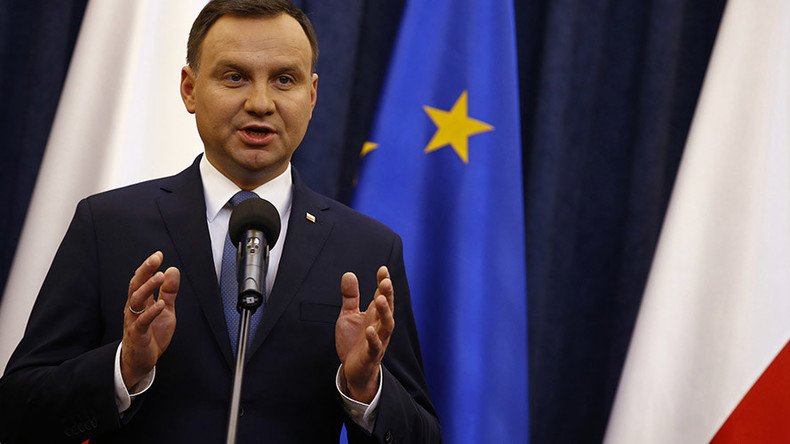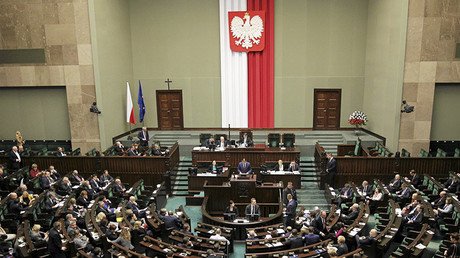‘Let’s not overdramatize’: EU downplays Polish govt state media seizure

Ignoring the concerns of EU politicians and media freedom groups, the Polish president has secured government control of state radio and TV. The EU Commission has downplayed the move, asking that it not be “overdramatized”.
The new amendment to the country’s media law, President Andrzej Duda believes, will make the media “impartial, objective and reliable.” According to presidential aide Malgorzata Sadurska the law was signed because Duda believes that broadcasters with no proper government control lacked “credibility.”
“We see that very often subjective, personal opinion ... replaces the objective information, which should reach the viewer or the listener,” Sadurska said. “The president will monitor public media” so that they remain objective and impartial, she added.
The new framework of state control of the media allows the government to terminate the contracts of executives running the state radio and television networks, TVP1 and Polskie Radio. The new heads will be appointed by the Polish treasury minister. Additionally, the law limits the number of members on the state broadcasters’ supervisory and management boards.
After initially voicing concern when the lower house of the Parliament passed the measure on December 30, the European Commission downplayed the Polish move to restrict freedom of speech in the country.
“Let’s not overdramatize. It’s an important issue. But we have to have friendly and good relations with Poland. Our approach is very constructive – we’re not bashing Poland,” European Commission President Jean-Claude Juncker said in Amsterdam, EUobserver reports.
“Freedom of expression and information, as well as the freedom of the press...are... essential for democracy, which is one of the fundamental values common to all Member States, on which the European Union is founded,” stated the Commission's briefing from April this year.
In the EU, freedom of the press is protected against “restrictions on media pluralism, especially in broadcasting, through undue governmental control and pressure over broadcasters or favoritism toward state- owned media.”
Furthermore according to the OSCE Representative on Freedom of the Media Factsheet, “free media, unfettered by government control, promotes a free exchange of views which can help reduce international tensions and prevent conflicts.”
By violating freedom of the press, Poland, under Article 7 of the EU treaty, should lose its EU Council voting rights. However Juncker believes Poland will get off clean.
“I don’t think it’ll come to that,” he said, adding that he is “very confident” that the Polish government will clarify and justify its intentions.
Committe for the Protection of #Democracy, a protest group, plans to hold pro #freemedia rallies in #Poland.
https://t.co/6f5JLnZQjI
— EUobserver (@euobs) January 8, 2016But despite Juncker’s cautious optimism, the new law drew much criticism before it was even signed. On Tuesday, EU human rights commissioner Nils Muiznieks urged Duda not to sign the controversial law. Reporters Without Borders (RSF) also spoke out against the signing of the law, calling it a “flagrant violation of media freedom and pluralism.”
“Poland is embarking on the anti-democratic road already taken by Viktor Orban’s Hungary. The European Union cannot allow itself to have two member-states that violate its Charter of Fundamental Rights so flagrantly,” said Alexandra Geneste, the head of RSF’s EU-Balkans desk in Brussels.
“Freedom and pluralism of the media are crucial for a pluralist society in a member state respectful of the common values on which the union is founded,” European Commission Vice President Frans Timmermans wrote in a letter to the Polish leadership in December.
Will the EU's actions speak louder than its words on Poland's new media law? - https://t.co/h0BGo7pQuT
— CPJ (@pressfreedom) January 7, 2016The opposition in Poland has called the clampdown a beginning of a “media takeover.”
“It’s the first step in a media takeover. I’m afraid the next laws will somehow limit the freedom of non-state media,” said Katarzyna Lubnauer, a lawmaker from the liberal Nowoczesna party.
The European Commission will debate Poland’s ruling on January 13, in a meeting that was set up after the Polish parliament’s approval of the legislation, to determine whether Warsaw’s move should result in Poland losing its EU voting rights in the 28-nation bloc.
The director general of the European Broadcasting Union (EBU), Ingrid Deltenre, said in a statement she was “dismayed by the president's decision” to sign a law before consulting Brussels.
“The fact that the government refused any discussion, or to accept any expert legal advice from the European Commission, Council of Europe or other media expert organisations, appears to reflect its overall attitude towards European institutions and fundamental democratic values.”












